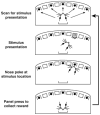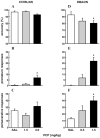Disruption of performance in the five-choice serial reaction time task induced by administration of N-methyl-D-aspartate receptor antagonists: relevance to cognitive dysfunction in schizophrenia
- PMID: 20488434
- PMCID: PMC2900523
- DOI: 10.1016/j.biopsych.2010.03.004
Disruption of performance in the five-choice serial reaction time task induced by administration of N-methyl-D-aspartate receptor antagonists: relevance to cognitive dysfunction in schizophrenia
Abstract
Schizophrenia patients suffer from cognitive impairments that are not satisfactorily treated by currently available medications. Cognitive dysfunction in schizophrenia encompasses deficits in several cognitive modalities that can be differentially responsive to different medications and are likely to be mediated by different neurobiological substrates. Translational animal models of cognitive deficits with relevance to schizophrenia are critical for gaining insights into the mechanisms underlying these impairments and developing more effective treatments. The five-choice serial reaction time task (5-CSRTT) is a cognitive task used in rodents that allows simultaneous assessment of several cognitive modalities, including attention, response inhibition, cognitive flexibility, and processing speed. Administration of N-methyl-D-aspartate (NMDA) glutamate receptor antagonists disrupts multiple 5-CSRTT performance measures in a way that mirrors various cognitive deficits exhibited by schizophrenia patients. Some of these disruptions are partially attenuated by antipsychotic medications that exhibit partial effectiveness on cognitive dysfunction in schizophrenia, suggesting that the model has predictive validity. Examination of the effects of pharmacological manipulations on 5-CSRTT performance disruptions induced by NMDA antagonists have implicated a range of brain regions, neurotransmitter systems, and specific receptor subtypes in schizophrenia-like impairment of different cognitive modalities. Thus, disruption of 5-CSRTT performance by NMDA antagonists represents a valuable tool for exploring the neurobiological bases of cognitive dysfunction in schizophrenia.
Copyright 2010 Society of Biological Psychiatry. Published by Elsevier Inc. All rights reserved.
Figures



References
-
- Elvevåg B, Goldberg TE. Cognitive impairment in schizophrenia is the core of the disorder. Crit Rev Neurobiol. 2000;14:1–2. - PubMed
-
- McGurk SR, Meltzer HY. The role of cognition in vocational functioning in schizophrenia. Schizophr Res. 2000;45:175–184. - PubMed
-
- Sharma T, Antonova L. Cognitive function in schizophrenia: deficits, functional consequences, and future treatment. Psychiatr Clin North Am. 2003;26:25–40. - PubMed
-
- Green MF, Kern RS, Heaton RK. Longitudinal studies of cognition and functional outcome in schizophrenia: implications for MATRICS. Schizophr Res. 2004;72:41–51. - PubMed
-
- Bilder RM, Lieberman JA, Kim Y, Alvir JM, Reiter G. Methylphenidate and neuroleptic effects on oral word production in schizophrenia. Neuropsychiatry Neuropsychol Behav Neurol. 1992;5:262–271.
Publication types
MeSH terms
Substances
Grants and funding
LinkOut - more resources
Full Text Sources
Medical

